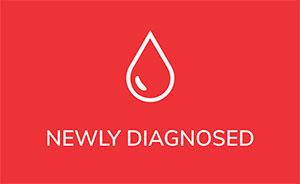
By Brian Koffman, MD
Introduction:
We understand that CLL / SLL is a disease of the immune system, but we need to keep in mind that its dysfunction can be manifested with a diminished capacity to fight off infections and secondary cancers, and an increased tendency to attack our own healthy cells, especially the blood cells.
It is the second set of problems that is the subject of this review.
These common complications of CLL / SLL are collectively known as autoimmune diseases (AID) and need to be recognized and managed differently than the cancer itself.
Since autoimmune disease and advancing cancer with decreased bone marrow production can both lead to low blood counts, it is critical that when low red blood cell count (anemia) or a low platelet count is discovered that AID is ruled out before starting on therapy for the CLL. Moreover, the treatment choices for AID are often more diverse and gentler than the therapies for CLL.
Cause:
While the mechanism of AID in CLL is not fully understood, we know that the autoantibodies responsible for destroying the blood cells are polyclonal which means they don’t come directly from the CLL cells themselves. Rather the dysfunctional activity of the T-cells that help regulate the immune response (regulatory T-cells or T-regs) is likely playing a role.
Autoimmune Hemolytic Anemia (AIHA):
Autoimmune hemolytic anemia (AIHA) is the most common autoimmune issue in CLL where a dysfunctional immune system destroys or lyses the red blood cells leading to anemia.
While prevalence data varies widely, and some studies suggest much higher numbers, probably about 7% of CLL patients have AIHA at some time in their disease.
Although AIHA may be the presenting problem found at the time of diagnosis, it usually more common as the disease advances and also in older patients regardless of their stage of the disease.
One particular therapy, fludarabine (F) and other similar purine analogues, has been associated with AIHA. When used in combinations (such as FCR or fludarabine, cyclophosphamide, and rituximab) as is the case in most modern therapies, the increased risk is eliminated.
The diagnostic workup for AIHA includes:
- A Direct Antiglobulin Test (DAT), also known as the direct Coombs
- Lactate dehydrogenase (LDH)
- Bilirubin
- Haptoglobin
- Reticulocyte count.
- A bone marrow examination is particularly important to differentiate between the causes of the anemia.
Treatment options are multiple and include steroids, rituximab, cyclosporine, IVIG and others.
Idiopathic thrombocytopenic purpura or immune thrombocytopenia (ITP):
Platelets are needed to prevent bruising and bleeding. A low platelet count is called thrombocytopenia and the cause we are reviewing here is immune, hence the name immune thrombocytopenia. Purpura is bleeding under the skin. Large areas of bleeding are known as bruises or ecchymoses and small ones are called petechiae. The older traditional name is idiopathic (of unknown cause) thrombocytopenic purpura or ITP.
ITP occurs less commonly, maybe in 2% of CLL patients. Risk factors are the same as in AIHA, as are the treatments, but newer drugs that mimic platelet growth factors (TPOs) can also be used, as well as surgical removal of the spleen, the organ that is responsible for filtering out many of the damaged platelets.
Other Rare Hematologic Immune Problems:
Pure Red Cell Aplasia (PRCA) attacks the immature red blood cell precursors in the bone marrow and Evans Syndrome is where the unlucky patient’s red cells and platelets are both being destroyed. Fortunately these are rare conditions in CLL.
Unusual Autoimmune Issues in CLL:
Cases have been reported on patients with CLL developing antibody-related diseases affecting the skin, nerves, clotting factors, thyroid, joints and other organs, though in most cases there is little or no causal evidence.
Summary:
The take away message here is that not all low blood counts are the same
Anemia and/or low platelets are not necessarily due to the advanced state of the disease. Autoimmune issues must be considered.
Fortunately these AID can usually be controlled with appropriate therapies and generally have a better prognosis than low counts from the disease itself.
Dr. Brian Koffman, a well-known doctor, educator and clinical professor turned patient has dedicated himself to teaching and helping the CLL community since his diagnosis in 2005. He serves as the unpaid medical director of the CLL Society Inc.
Originally published in The CLL Tribune Q4 2016.

















